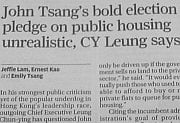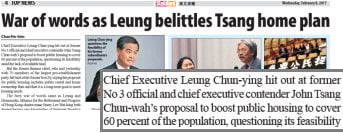Hong Kong’s soon-to-be-ex- Chief Executive CY Leung attacks hopeful successor John Tsang for one of his vague sort-of policy proposals. Previous quasi-elections in the city do not provide much precedent for such intervention by the incumbent, so it’s a mild surprise. No-hope rival Justice Woo is among those expressing shock at the display of favouritism.
Of course, criticism from the widely loathed CY can only benefit John as the public’s underdog choice. This is the sort of support Beijing’s pre-arranged ‘winner’ Carrie Lam can do without. So why didn’t CY just keep his mouth shut?
Partly, perhaps, because he and John detest each other, and John’s proposed ‘policy’ – a major increase in public-housing provision – is a clear rebuke of CY’s own record in office.
 But mostly, we can guess it’s because CY has a pathological, compulsive need to shoe-shine the Communist Party to obvious and embarrassing excess. His clumsy assault on Carrie’s main threat in terms of public approval is a gratuitous attempt to serve his masters in Zhongnanhai. He is trying to be helpful.
But mostly, we can guess it’s because CY has a pathological, compulsive need to shoe-shine the Communist Party to obvious and embarrassing excess. His clumsy assault on Carrie’s main threat in terms of public approval is a gratuitous attempt to serve his masters in Zhongnanhai. He is trying to be helpful.
(The same instinct prompted CY to commend John Tsang’s position on Article 23 national security laws. In this case, his ‘kiss of death’ was aimed in the right direction – such approval can only damage poor John’s public image.)
Sadly, the press did not probe either John or CY on the pros and cons of increasing subsidized housing coverage from around 45% to 60% of the population.
To John, it is basically an eye-catching ‘populist’ PR stunt, even if it makes sense under current circumstances, assuming other supply/demand/cost/policy variables all remain static. If the private sector produces housing only 40% of people can afford, the state sector must by definition make provisions for the other 60% of the population.
To CY, the zero-sum result is that lowering land supply for the private sector will make the problem worse by further raising private housing costs. Conversely (the media could have asked but didn’t) wouldn’t the logical solution be to reduce the amount of public subsidized housing? (In theory it could, if you sell public housing and turn state tenant-serfs into landed citizens – but of course no-one dares consider anything so radical.)
Look – all we are talking about here is concrete boxes. No-one cares whether they’re ‘private’ or ‘public’, so long as they’re affordable. To solve the Hong Kong housing problem, we could start by replacing the phrase ‘subsidized’ with the more accurate ‘not subject to vast additional cartel/bureaucrat charges’ and take it from there.
As for Article 23 – God help the Chief Executive who has to try that again.
The latest, according to nearly everyone, is that Beijing official Zhang Dejiang (I thought he was getting purged sometime?) says that the Communist Party’s pick Carrie Lam is the Communist Party’s pick, and you can stuff her Facebook page full of ‘angry’ emojis all you like, so there.


Hopefully John or Carrie can convince the unrepresented masses (all of us) how wonderful life will be in public housing as private property will never become affordable when the Lands Department sells plots to the highest bidder without any restrictive covenant. Hong Kong land for Hong Kong people indeed.
Just think in a week or so time we can fondly look back at what happened the last time a deeply religious, senior civil servant (Chief Secretary) became Chief Executive ?
Zang Dejiang…advanced degree in economics or business or whatever from PYONGYANG.
Nuff said…
“Look – all we are talking about here is concrete boxes. No-one cares whether they’re ‘private’ or ‘public’, so long as they’re affordable.”
I think it should be:
Look – all we are talking about here is concrete boxes. No-one cares whether they’re ‘private’ or ‘public’, so long as they’re good investments.
I think this is borne out by the fact that in many of the recent sales of HOS developments, lots of units went unsold. The potential buyers all knew the general terms and prices before they applied, but turned down the opportunity once they had it.